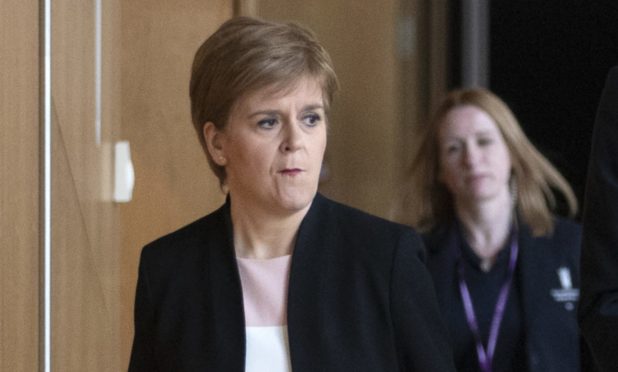Scrutiny of Scottish politicians beyond these borders is understandably half-hearted.
There is enough going on in the national political theatre for any regional drama to be but a side show to all except the local audience.
Thus, even when our highest profile ministers are quizzed on, say, the Today show, or Question Time, or any other mainstream platform, they are invariably let off the hook.
Nicola Sturgeon, who puts herself about more than most of her Holyrood colleagues, appreciates the value of this kind of public exposure.
Like Margaret Thatcher finding unconditional love among Russians when she was at her most unpopular back home, Sturgeon can take refuge in a media interview conducted some distance from her familiar critics.
So it wasn’t surprising that she chose a national Sunday title this week to freshen up her image and announce to an unsuspecting world that she had a healthy respect for evidence and facts.
‘I think there is something maybe quite Scottish about this,’ she went on, presumably thinking of some of her predecessors and chuckling quietly to herself.
Among the ‘facts’ she shared with her inquisitor was the one about Scotland being at a ‘tipping point’ on the road to independence.
This is something Nationalists tell each other on a regular basis but, as poll after poll shows, there has been no change in voters’ attitudes towards separation since the defeat of the Yes campaign in 2014.
‘I always try to argue from quite a rational position,’ Sturgeon said, forgetting that just a week ago she went to Brussels to negotiate an independent Scotland’s readmission to the EU, despite the hurdle of Scotland still being very much a part of the UK.
She also managed to convince the interviewer of her ‘astronomical popularity’ whereas even her own party stalwarts were wary of mentioning her name on doorsteps during the December general election.
The First Minister’s star has long been on the wane in the real world of Scottish politics, and the possible date of her departure is discussed openly inside and outside her party.
In fact, much of the SNP’s dismay over the recent downfall of finance minister Derek Mackay centred on the loss of the most likely successor to Sturgeon.
And that brings us to the reason for this latest bout of attention seeking. The SNP leader will not be able to orchestrate the headlines during next month’s trial of her former boss, Alex Salmond, on sex offences.
A ‘Queen of the North’ cover story in a national title must seem a delightful and timely distraction, not just from the internal travails of her party but also from the challenges of the day job.
The details of Nationalist failures on the domestic front – particularly in the departments of health and education – need not detain the FM too much if she can switch the story to Scotland’s ‘right to choose’.
Fortunately, in Boris Johnson, she has a suitable Westminster pantomime villain, a ‘democracy denier’ who has refused to grant Scotland permission to re-run the independence referendum.
But although she insists he has been ‘one of the biggest recruiting sergeants’ for her independence cause, the majority of Scots have no appetite for further constitutional upheaval.
Sturgeon, whatever her fancy rhetoric, knows she hasn’t got the numbers and she probably knows too that her own chances of achieving them are fast dwindling.
The difference between the real Sturgeon and a great leader who still has control over her party’s and country’s destiny is stark.
What better than a blur of activity to camouflage both her disappointment and the growing distrust among her once loyal activists in her ability to deliver.
She is just about keeping at bay the hostility between her leadership and the discontents in the SNP, parliamentarians as well as the rank and file, and she must look busy.
The reshuffling of her cabinet is another decoy, driven by the need to replace Mackay but providing an illusion of a government going about its business when it is merely covering up the cracks.
In appointing and promoting women, Sturgeon has ensured favourable coverage, but her female ministers will be no better than their male counterparts if they continue to put party priorities ahead of their portfolios.
What will she do next? To salvage what is left of her legacy she should spend more time in London, where she can be sure of some of the hero worship she used to enjoy in Scotland.
But here she now can’t avoid being regarded as a political star who never fulfilled her promises, either to her Nationalist supporters who expected her to finish what Salmond had started, or to the rest of her fellow Scots, who hoped she would be as good as her word in trying to improve their lives.


